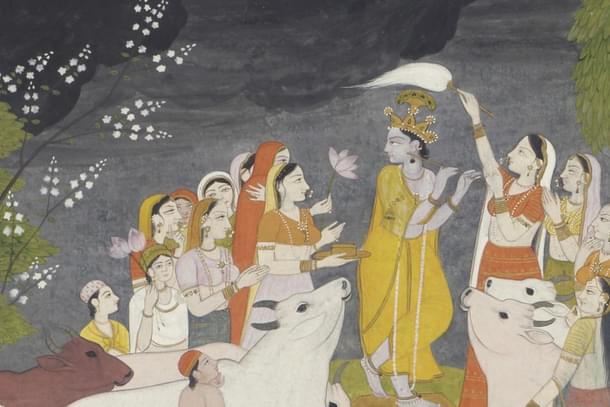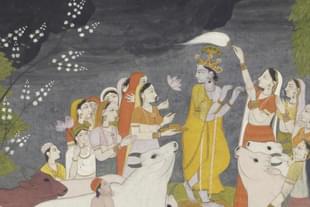Culture
Could Krishna Be Guilty Of Adultery?
Chandru
Jul 03, 2021, 08:05 AM | Updated 08:11 AM IST
Save & read from anywhere!
Bookmark stories for easy access on any device or the Swarajya app.


In the recent Shiva Shankar Baba related developments in Tamil Nadu, one of the troubling facets is the accused's alleged attempt to exploit the females by projecting himself as Lord Krishna and turning the victims into Gopikas.
For context, Shiva Shankar Baba is in judicial custody for his reported sexual advances against multiple women. A similar narrative was found during the alleged misconduct of the besmirched guru, Nityananda.
Osho Rajneesh, the last century's controversial spiritualist known for advocacy of free sex, appreciates Krishna for his non-restrictive nature. Even the Supreme Court of India, in the context of legalising the 'live-in relationship', cited Krishna and Radha as examples. These are a few occurrences where the 'Krishna-Gopika-companionship' is hauled to buttress the idea of free sex or similar propositions.
Here comes a question. Was Krishna originally a womaniser or playboy? Was Krishna, an unparalleled icon of Indic culture and civilisation, adulterous?
The foundational premise to remember is that Mahabharata is the most authentic literature to understand Krishna since its major portions were written by Krishna's contemporaries. It is the oldest text to deal with his life account. And yet, there is not a shred of evidence on Krishna's free sex in Mahabharata, a magnum opus comprising 100,000 verses, including its interpolations and in all its recensions.
Mahabharata's Krishna is not a playboy. He is a statesman, philosopher, yoga master, moral compass, philanthropist, and social worker. Though he was a polygamist, no chapter in Mahabharata dedicatedly describes Krishna's love-sport with his own women, leave alone his extra-marital escapades.
However, Vishnu Purana, which came into existence many centuries (if not a few millennia) after Mahabharata by most scholars' estimate, has a small paragraph talking about Krishna's love-sport with other men's wives.
Surprisingly, one cannot find Krishna's adultery in the Tamil poems from Sangam literature to Alvars' (poet-saints) compositions, though his love-making episodes are described abundantly. It is Alvars' literature, which chronicles a devotee's devotion as a beloved's affection. These are filled with romantic passions. Yet, nowhere in these poems do we see adultery or live-in relationships.
Bhagavata Purana, a Sanskrit text dealing with Krishna's supposed exploits, magnifies and intensifies Krishna's extra-marital affairs. Though it's a common belief that Bhagavata Purana was written by the author of Mahabharata, researchers sharply disagree.
Bhagavata's guesstimated date by eminent scholars oscillates between the second century BCE and twelfth century CE.
As it details the lineages of Mauryas and Shungas, it is clear that this text came only after them. Anyhow, only after the 12th century, writers started to quote from Bhagavata Purana.
Since Bhagavata Purana's birth, numerous literary works such as Jayadeva's Ashtapadi began to roister Krishna's love-making characteristics in the last millennium. Several erotic or rather pornographic literary works are composed with Krishna's pleasure-centric trait as the theme. Regrettably, few sects claim that this kind of love-making is the highest spiritual attainment and other paths are only the baby steps in spiritual seeking.
Sadly, a renowned philosopher, statesman and altruist of Mahabharata is degraded into a playboy and womaniser. It is a long departure from Mahabharata's Krishna. Bhagavata Purana justifies such a depiction by stating that the splendorous people do not get affected if they commit crimes like adultery transgressing Dharma. But who determines who's 'splendorous' and what's the yardstick?
Despite the act of adultery being decriminalised in 2018, it is frowned upon in the large sections of Indian society, and it is not something expected from a great soul.
Furthermore, Bhagavata Purana takes it a step further and says those who freed themselves by transcending Karma through the meditation of Krishna's lotus feet – are not afflicted by sin if they commit such things (10.33.34.). Again, who can decide whom to be free from the bindings of Karma? All these kinds of claims can only lead to several scandals.
In the words of Mahabharata's Krishna in the Gita, "there is no duty for me to do in all the three worlds, nor do I have anything to gain or attain. Yet, I am engaged in prescribed duties. For if I did not carefully perform the prescribed duties, all men would follow my path in all respects. If I ceased to perform prescribed actions, all these worlds would perish. I would be responsible for the pandemonium that would prevail, and would thereby destroy the peace of the human race (3.22-25)".
Such a duty-bound Krishna filled with moral fibre, and upright societal responsibility cannot lose himself in activities as portrayed in the recent erotic works.
Aside from this, merits are found in considering god as a lover. In Indian history, several socially persecuted women like widows, concubines, and several other victims of male chauvinism—for no fault of their own—had sought spiritual solace and drew strength by considering god as their companion or husband.
Devotion becomes intense when god is seen as a lover. Therefore, several devotees prefer this style of devotion. This is universal as well. As we find in Hindu culture, the acceptance of Krishna as the companion, many nuns in Christianity take Jesus to be their husband, while in Sufism, several saints consider Allah as their beloved. In its practice (if at all it has to be practised), if a devotee doesn't take precautionary steps, he/she will be afflicted by its victimising elements.
Nevertheless, historically speaking, Krishna is not boisterous, adulterous, and sensualist.
A practicing and enthusiastic researcher of Hindu scriptures.




